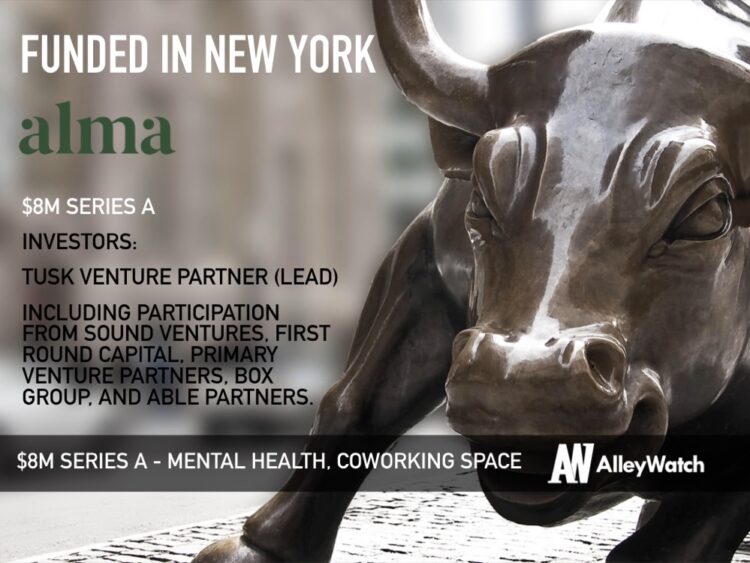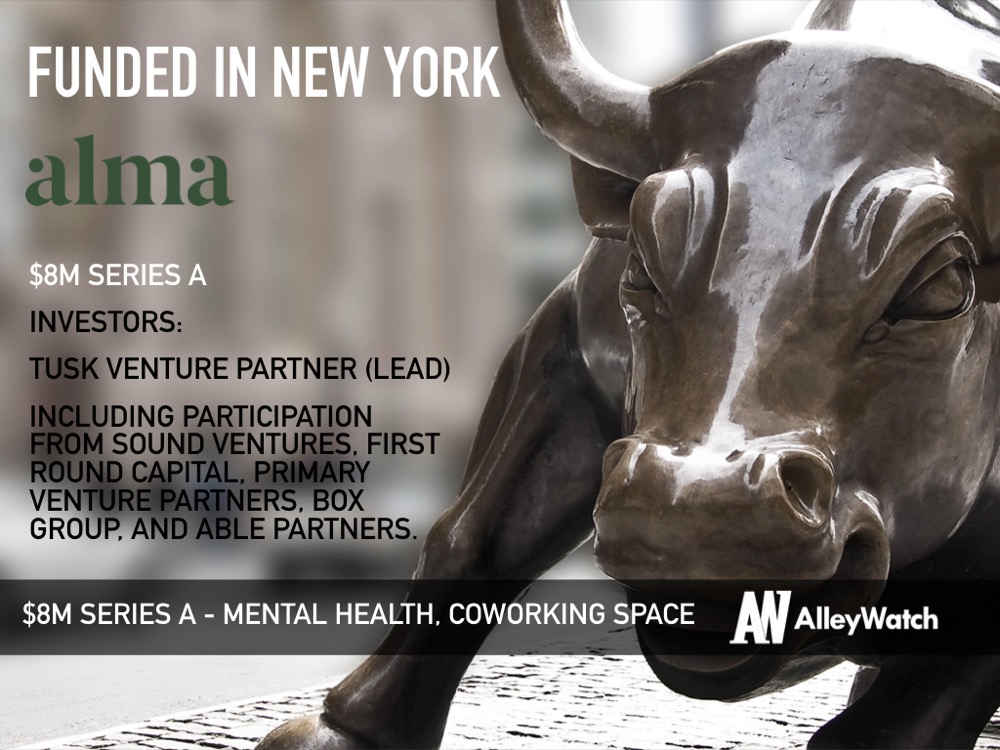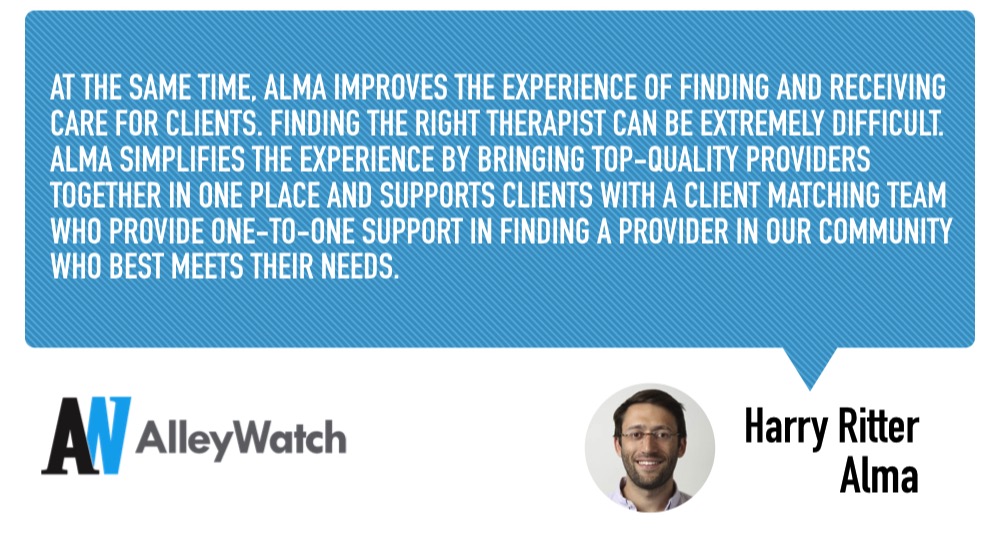There are over 700,000 mental health professionals in the US alone with a 20% average growth rate year-over-year. Alma caters to this burgeoning community of mental health practitioners with its co-practicing community for therapists, coaches, and wellness professionals. Members are able to effectively grow their business with a tailored experience, complete with the tools and resources designed to handle operations and expansion so that the members can focus less on the business and more on providing care. Choosing to see a mental health provider is not always the easiest decision for patients and to address this there’s an in-house Client Matching team that provides one-to-one personalized high-touch point support to find a compatible provider from the Alma community.
AlleyWatch chatted with Harry Ritter to learn more about Alma’s plans to expand its membership platform and its recent funding round, which brings the company’s total funding $12.5M over two rounds.
Who were your investors and how much did you raise?
Our $8M Series A was led by Tusk Venture Partners, with participation from Sound Ventures, First Round Capital, Primary Venture Partners, Box Group, and Able Partners, among others.
Tell us about the product or service that Alma offers.
Alma is building co-practicing communities for therapists, coaches, and wellness professionals. Providers who join Alma are supported by the tools and resources they need to run and grow their practice, so they can focus on providing great care. And by bringing providers together into our communities, we make it easier for people looking for care to find what they need at Alma.
 What inspired you to start Alma?
What inspired you to start Alma?
The mental health conversation in our country is at an inflection point. An increasing number of public figures are sharing their personal experiences, the state of mental health is constantly making headlines, and more and more people are seeking care. Unfortunately, the healthcare industry isn’t equipped to keep up. Of the 700,000 mental health professionals in the U.S., most lack the proper business tools, technology, and functional workspaces to effectively grow their practices and accommodate the growing number of people seeking care.
I saw this firsthand when I was at Oscar Health building their first primary care and wellness space for Oscar members. Having benefited enormously from therapy myself, I wanted access to mental health to be a key part of the experience. And yet because we still referred patients outside of the Oscar Center for therapy, we were continually frustrated by a mental health landscape that was disorganized, fragmented, and delivered a subpar experience.
How is Alma different?
At Alma, we set out to take a fundamentally different approach to the mental health crisis: building a platform that champions and supports mental health providers so they can focus on delivering great care. We believe that by bringing providers together into co-practicing communities supported with business tools, beautifully-designed workspaces, and a collaborative community of their peers, we can improve the experience, quality, and accessibility of mental health care for everyone.
At the same time, Alma improves the experience of finding and receiving care for clients. Finding the right therapist can be extremely difficult. Alma simplifies the experience by bringing top-quality providers together in one place and supports clients with a Client Matching team who provide one-to-one support in finding a provider in our community who best meets their needs.
What market does Alma target and how big is it?
Alma aims to build a national network of top-quality providers, with co-practicing communities across the U.S. Mental health is a $195B market with space to grow and there are over 700,000 mental health providers in the U.S. (compared to 250,000 primary care providers), with almost 20% growth on average in the labor market year over year.
What’s your business model?
Alma is a membership model – mental health providers join Alma as members and pay monthly membership dues and pay for space on a per hour basis.
How has the business changed since we last spoke after Alma’s seed round in October?
We remain focused on the same major challenges in the market – helping to support great mental health providers with space, services, and technology to help them deliver great care. One thing that we’ve been surprised by is how excited consumers have been about the Alma experience and using Alma as a way to find the right provider.
One thing that we’ve been surprised by is how excited consumers have been about the Alma experience and using Alma as a way to find the right provider.
That’s what led us to invest more in the discovery experience, including new features like our Client Matching Team, which works with prospective clients to find the right fit in the Alma community.
What was the funding process like?
My favorite part of the fundraising process is the opportunity to speak with and learn from world-class investors. Going out and sharing your business, answering questions, and articulating the vision makes you a better leader and helps refine your own ideas enormously. We feel incredibly fortunate to have found a world-class investment team at Tusk Ventures led by Jordan Nof to join our board.
What are the biggest challenges that you faced while raising capital?
While the stigma around mental health is evolving rapidly, there’s a lot more work to be done, and you see that from time-to-time in the fundraising process. We believe that mental health should be on parity with physical health, and we should approach preventive mental wellbeing in the same way we think about physical wellness. Many investors we spoke to got that immediately, but it’s still an evolving landscape.
What factors about your business led your investors to write the check?
You’d have to ask them! I believe there are three things that are key, though: first, the market. Mental health is a massive problem in our country and the challenges are only getting worse. Our investors see the enormity of the need and potential opportunity. Second, the team. I’m incredibly proud of the team we’re building at Alma, and I think our culture and the kind of talent we attract are a huge competitive advantage. Lastly, I think our investors see enormous opportunity in our model. We’re creating a fundamentally new way for providers to practice, and that platform opens up incredible opportunities for our network to tackle fundamental challenges like stigma, discovery, and affordability.
What are the milestones you plan to achieve in the next six months?
With the announcement of our Series A, we also launched Community Membership, a new membership type for providers who don’t currently need space but are eager to benefit from the Alma community. Community Members will have access to the network, including client referral opportunities, as well as community events and peer supervision groups. We’ll also help Community Members grow their practices, with profiles on Alma’s website and our newly launched Client Matching service, which helps prospective clients find the right provider in the Alma community.
Community Members will have access to the network, including client referral opportunities, as well as community events and peer supervision groups. We’ll also help Community Members grow their practices, with profiles on Alma’s website and our newly launched Client Matching service, which helps prospective clients find the right provider in the Alma community.
We’re also working on physical expansion in New York, as well as partnerships with payers and employers that will dramatically impact affordability and access.
What advice can you offer companies in New York that do not have a fresh injection of capital in the bank?
Take the time to really get to know your customers. Before I started Alma, I worked out of coffee shops around the city and would try to schedule 1-2 meetings every day with providers to better understand their needs. For our first 6 months, we worked out of our first co-practicing community, and right now our offices are in the same building. It really makes a difference to spend time with customers in person, not just through polls or surveys.
Where do you see the company going now over the near term?
In the near term, we’ll focus on growing and supporting our community of providers in New York City, building partnerships with payers and employers to increase access and affordability, and improving the tools, technology, and services we offer Alma members and their clients.
Where is your favorite bar in the city for an after work drink?
With two kids at home, I don’t have one. If I’m able to get out of work early, my favorite watering hole is my kitchen table sharing a glass of milk with my boys.





